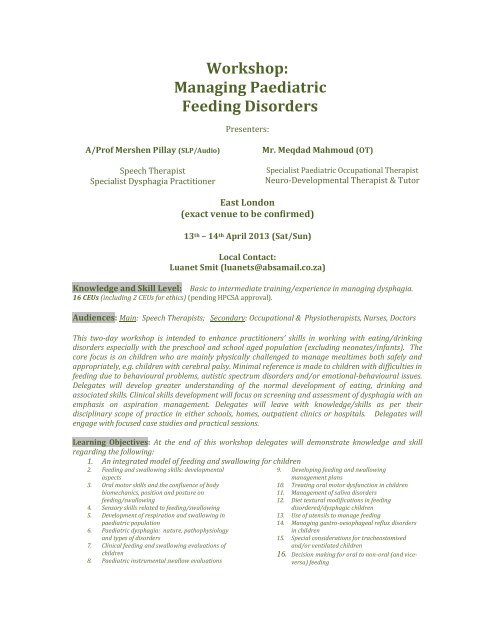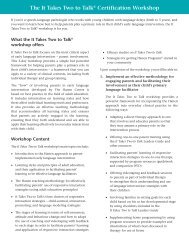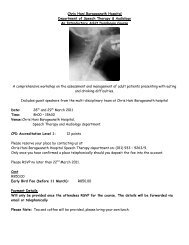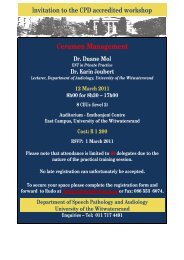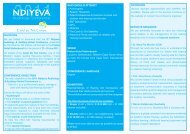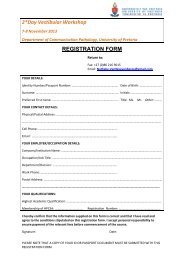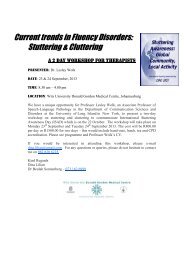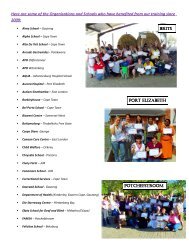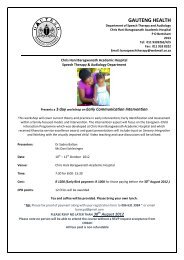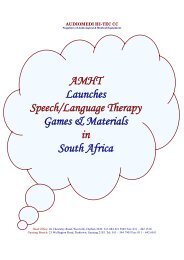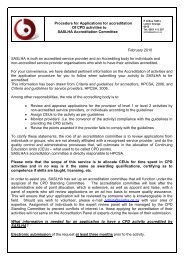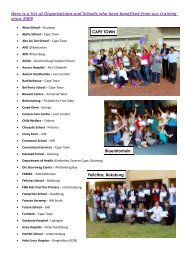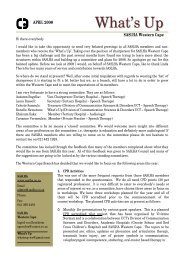Knowledge and Skill Level: Basic to intermediate - saslha
Knowledge and Skill Level: Basic to intermediate - saslha
Knowledge and Skill Level: Basic to intermediate - saslha
Create successful ePaper yourself
Turn your PDF publications into a flip-book with our unique Google optimized e-Paper software.
Workshop:<br />
Managing Paediatric<br />
Feeding Disorders<br />
Presenters:<br />
A/Prof Mershen Pillay (SLP/Audio)<br />
Speech Therapist<br />
Specialist Dysphagia Practitioner<br />
Mr. Meqdad Mahmoud (OT)<br />
Specialist Paediatric Occupational Therapist<br />
Neuro-Developmental Therapist & Tu<strong>to</strong>r<br />
East London<br />
(exact venue <strong>to</strong> be confirmed)<br />
13 th – 14 th April 2013 (Sat/Sun)<br />
Local Contact:<br />
Luanet Smit (luanets@absamail.co.za)<br />
<strong>Knowledge</strong> <strong>and</strong> <strong>Skill</strong> <strong>Level</strong>: <strong>Basic</strong> <strong>to</strong> <strong>intermediate</strong> training/experience in managing dysphagia.<br />
16 CEUs (including 2 CEUs for ethics) (pending HPCSA approval).<br />
Audiences: Main: Speech Therapists; Secondary: Occupational & Physiotherapists, Nurses, Doc<strong>to</strong>rs<br />
This two-day workshop is intended <strong>to</strong> enhance practitioners’ skills in working with eating/drinking<br />
disorders especially with the preschool <strong>and</strong> school aged population (excluding neonates/infants). The<br />
core focus is on children who are mainly physically challenged <strong>to</strong> manage mealtimes both safely <strong>and</strong><br />
appropriately, e.g. children with cerebral palsy. Minimal reference is made <strong>to</strong> children with difficulties in<br />
feeding due <strong>to</strong> behavioural problems, autistic spectrum disorders <strong>and</strong>/or emotional-behavioural issues.<br />
Delegates will develop greater underst<strong>and</strong>ing of the normal development of eating, drinking <strong>and</strong><br />
associated skills. Clinical skills development will focus on screening <strong>and</strong> assessment of dysphagia with an<br />
emphasis on aspiration management. Delegates will leave with knowledge/skills as per their<br />
disciplinary scope of practice in either schools, homes, outpatient clinics or hospitals. Delegates will<br />
engage with focused case studies <strong>and</strong> practical sessions.<br />
Learning Objectives: At the end of this workshop delegates will demonstrate knowledge <strong>and</strong> skill<br />
regarding the following:<br />
1. An integrated model of feeding <strong>and</strong> swallowing for children<br />
2. Feeding <strong>and</strong> swallowing skills: developmental<br />
aspects<br />
3. Oral mo<strong>to</strong>r skills <strong>and</strong> the confluence of body<br />
biomechanics, position <strong>and</strong> posture on<br />
feeding/swallowing<br />
4. Sensory skills related <strong>to</strong> feeding/swallowing<br />
5. Development of respiration <strong>and</strong> swallowing in<br />
paediatric population<br />
6. Paediatric dysphagia: nature, pathophysiology<br />
<strong>and</strong> types of disorders<br />
7. Clinical feeding <strong>and</strong> swallowing evaluations of<br />
children<br />
8. Paediatric instrumental swallow evaluations<br />
9. Developing feeding <strong>and</strong> swallowing<br />
management plans<br />
10. Treating oral mo<strong>to</strong>r dysfunction in children<br />
11. Management of saliva disorders<br />
12. Diet textural modifications in feeding<br />
disordered/dysphagic children<br />
13. Use of utensils <strong>to</strong> manage feeding<br />
14. Managing gastro-oesophageal reflux disorders<br />
in children<br />
15. Special considerations for tracheos<strong>to</strong>mised<br />
<strong>and</strong>/or ventilated children<br />
16. Decision making for oral <strong>to</strong> non-oral (<strong>and</strong> viceversa)<br />
feeding
Presenters’ Biographies:<br />
A/Prof. Mershen Pillay is a speech-language therapist <strong>and</strong> audiologist. In London<br />
(Engl<strong>and</strong>), Mershen, currently employed at Stellenbosch University, provided specialist<br />
services <strong>to</strong> adults with severe disorders through Lewisham’s community services<br />
<strong>and</strong> the Royal Free & St Pancras hospitals. In SA, he was a clinical tu<strong>to</strong>r <strong>and</strong> lecturer<br />
(UKZN) <strong>and</strong> also provided private services <strong>to</strong> hospitals <strong>and</strong> schools. In the United<br />
Arab Emirates he has worked as a clinical practitioner/rehabilitation supervisor at a<br />
Clevel<strong>and</strong> Clinic managed hospital (Sheikh Khalifa Medical City, United Arab<br />
Emirates). He has practiced under accreditation by the Joint Commission for<br />
International Accreditation <strong>and</strong> is currently Supervisor of Audiology <strong>and</strong> Speech<br />
Pathology services at Mafraq hospital (Abu Dhabi). He is competent with a range of<br />
non-instrumental/instrumental assessment <strong>and</strong> therapy methods such as<br />
videofluoroscopic swallow_ <strong>and</strong> fibre-optic endoscopic evaluation of swallowing<br />
(FEES) studies, surface electromyography (sEMG) <strong>and</strong> techniques such as deep<br />
neuromuscular pharyngeal stimulation. He has also received training under masterclinicians<br />
such as Prof Susan Langmore (USA) who is the inven<strong>to</strong>r of FEES <strong>and</strong> an<br />
ASHA Board Recognised Specialist in Dysphagia. Mershen served as the Edi<strong>to</strong>r-in-<br />
Chief of the SA Journal of Communication Disorders <strong>and</strong> is an active clinical<br />
researcher. He has honorary positions as research associate at the University of<br />
Cape Town <strong>and</strong> as a senior lecturer involved in post-graduate student training at the<br />
University of KwaZulu Natal. He presents <strong>and</strong> publishes his work on<br />
dysphagia/other <strong>to</strong>pics in South Africa, Europe, the UK, the USA, Canada, the Middle<br />
East, the East, Australia <strong>and</strong> the Caribbean. He is also a contributing author in an<br />
international textbook on life his<strong>to</strong>ry research (by Sense Publishers, Rotterdam,<br />
2009) <strong>and</strong> in Occupational Therapy without Borders: Volume 2 (Elsevier, 2011).<br />
Meqdad Mahmoud is a Palestinian/Jordanian Occupational Therapist who worked<br />
with Mershen in Abu Dhabi at the Bumrungrad International managed, Mafraq<br />
Hospital. He has worked across Saudi Arabia <strong>and</strong> the United Arab Emirates. He<br />
provides specialist paediatric OT services <strong>and</strong> is highly respected in the region as<br />
well as internationally. Meqdad is a Bobath Tu<strong>to</strong>r (trained across Engl<strong>and</strong> <strong>and</strong> South<br />
Africa) <strong>and</strong> is currently a student at UCT’s Disability Studies Unit. Like Mershen,<br />
Meqdad has worked as a supervisor <strong>and</strong> clinical practitioner at a Joint Commission<br />
for International Accreditation hospital (Clevel<strong>and</strong> Clinic-Sheikh Khalifa Medical<br />
City) <strong>and</strong> has been instrumental in developing OT services in the UAE.


